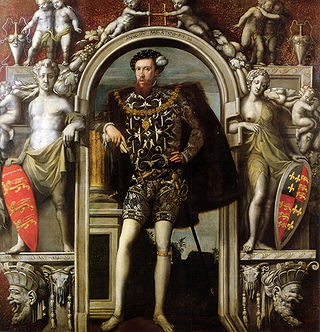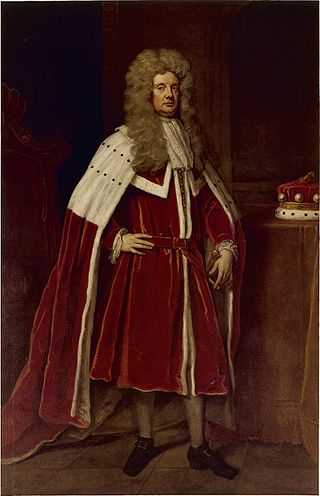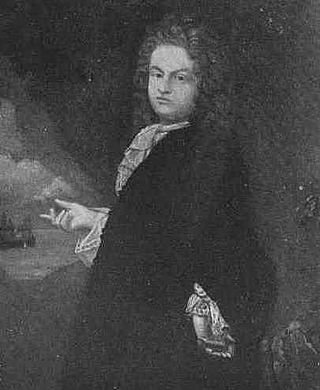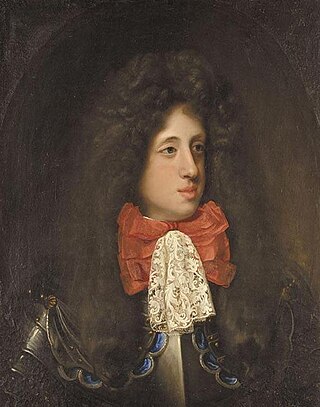Related Research Articles

Copyhold was a form of customary land ownership common from the Late Middle Ages into modern times in England. The name for this type of land tenure is derived from the act of giving a copy of the relevant title deed that is recorded in the manorial court roll to the tenant, rather than the actual land deed itself. The legal owner of the manor land remained the mesne lord, who was legally the copyholder, according to the titles and customs written down in the manorial roll. In return for being given land, a copyhold tenant was required to carry out specific manorial duties or services. The specific rights and duties of copyhold tenants varied greatly from one manor to another and many were established by custom. By the 19th century, many customary duties had been replaced with the payment of rent.

Henry Howard, Earl of Surrey, KG was an English nobleman, politician and poet. He was one of the founders of English Renaissance poetry and was the last known person to have been executed at the insistence of King Henry VIII. His name is usually associated in literature with that of the poet Sir Thomas Wyatt. Owing largely to the powerful position of his father Thomas Howard, 3rd Duke of Norfolk, Henry took a prominent part in court life, and served as a soldier both in France and in Scotland. He was a man of reckless temper, which involved him in many quarrels, and finally brought upon him the wrath of the ageing Henry VIII. He was arrested, tried for treason and beheaded on Tower Hill.
Primogeniture is the right, by law or custom, of the firstborn legitimate child to inherit the parent's entire or main estate in preference to shared inheritance among all or some children, any illegitimate child or any collateral relative. In most contexts, it means the inheritance of the firstborn son ; it can also mean by the firstborn daughter, or firstborn child.

The Popery Act of 1704 required land owned by Roman Catholics to be divided equally between all a landholder's sons, both legitimate and illegitimate, on his death. This had formerly been normal under the law of gavelkind, a law abolished by the Dublin administration in 1604. Known as sub-division, this inheritance practice continued by tradition until the middle of the 19th century.

An appanage, or apanage, is the grant of an estate, title, office or other thing of value to a younger child of a monarch, who would otherwise have no inheritance under the system of primogeniture. It was common in much of Europe.

Gavelkind was a system of land tenure chiefly associated with the Celtic law in Ireland and Wales and with the legal traditions of the English county of Kent.

Succession to the British throne is determined by descent, sex, legitimacy, and religion. Under common law, the Crown is inherited by a sovereign's children or by a childless sovereign's nearest collateral line. The Bill of Rights 1689 and the Act of Settlement 1701 restrict succession to the throne to the legitimate Protestant descendants of Sophia of Hanover who are in "communion with the Church of England". Spouses of Catholics were disqualified from 1689 until the law was amended in 2015. Protestant descendants of those excluded for being Roman Catholics are eligible.

Charles Calvert, 3rd Baron Baltimore was an English colonial administrator. He inherited the province of Maryland in 1675 upon the death of his father, Cecil Calvert, 2nd Baron Baltimore. He had been his father's Deputy Governor since 1661 when he arrived in the colony at the age of 24. However, Charles left Maryland for England in 1684 and would never return. The events following the Glorious Revolution in England in 1688 would cost Calvert his title to Maryland; in 1689 the royal charter to the colony was withdrawn, leading to direct rule by the British Crown. Calvert's political problems were largely caused by his Roman Catholic faith which was at odds with the established Church of England.

An Act to prevent the further Growth of Popery was an act of the Parliament of Ireland that was passed in 1704 designed to suppress Roman Catholicism in Ireland ("Popery"). William Edward Hartpole Lecky called it the most notorious of the Irish Penal Laws.

The Protestant Ascendancy was the sociopolitical and economical domination of Ireland between the 17th and early 20th centuries by a small Anglican ruling class, whose members consisted of landowners, politicians, clergymen, military officers and other prominent professions. They were either members of the Church of Ireland or the Church of England and wielded a disproportionate amount of social, cultural and political influence in Ireland. The Ascendancy existed as a result of British rule in Ireland, as land confiscated from the Irish Catholic aristocracy was awarded by the Crown to Protestant settlers from Great Britain.
Partible inheritance, sometimes also called partitive, is a system of inheritance in which property is apportioned among heirs. It contrasts in particular with primogeniture, which was common in feudal society and requires that the whole or most of the inheritance passes to the eldest son, and with agnatic seniority, which requires the succession to pass to next senior male.

Forced heirship is a form of testate partible inheritance which mandates how the deceased's estate is to be disposed and which tends to guarantee an inheritance for family of the deceased.

Frederick Philipse, first Lord of the Manor of Philipseborough and patriarch of the Philipse family, was a Dutch immigrant to North America of Bohemian heritage. A slave trade merchant, he arrived in America as early as 1653. In 1662, he married Margaret Hardenbrook de Vries, a wealthy and driven widow. Together, and variously in league with slavers, pirates, and other undesirables alongside the prominent and respectable, the couple amassed a fortune.
An order, line or right of succession is the line of individuals necessitated to hold a high office when it becomes vacated, such as head of state or an honour such as a title of nobility. This sequence may be regulated through descent or by statute.
Events from the year 1703 in Ireland.

Duke Maximilian William of Brunswick-Lüneburg, often called Max, was a member of the House of Hanover who served as an Imperial Field Marshal.
Sir Maurice Eustace was an Irish landowner, politician, barrister and judge of the seventeenth century who spent the last years of his career as Lord Chancellor of Ireland. This was an office for which he felt himself to be entirely unfit, and in which he was universally agreed to be a failure.
Events from the year 1704 in Ireland.
Historical inheritance systems are different systems of inheritance among various people.
Sir Theobald (Toby) Butler (1650–1721) was a leading barrister and politician in late seventeenth-century Ireland, who held office as Solicitor General for Ireland. He is mainly remembered for framing the civil articles of the Treaty of Limerick, and for his eloquent but unsuccessful plea to the Irish House of Commons against the passing of the Popery Act 1704, which allowed any Protestant son of a Roman Catholic landowner to prevent his Catholic brothers from inheriting the family property. He was a much loved "character" in Dublin, and his great popularity shielded him from the penalties that he might otherwise have suffered as a result of his religious beliefs. Only his few enemies attacked him for his willingness to come to an accommodation with the new regime in order to preserve his own property.
References
- ↑ Connolly S.J. (1998). The Oxford Companion to Irish History . Oxford University Press. p. 219. ISBN 0-19-211695-9.
- 1 2 Andrew Lyall; Land Law in Ireland; ISBN 1-85800-199-4
- Robinson, On Gavelkind
- Digby, History of the Law of Real Property
- Pollock and F. W. Maitland, History of English Law
- Challis, Real Property.